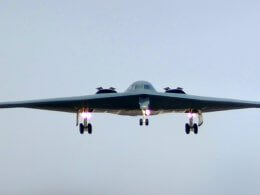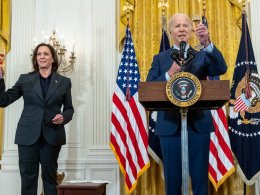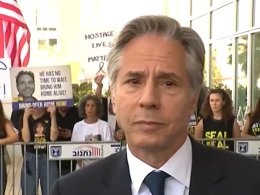As the eyes of the world continue to watch Iran due to the ongoing anti-government protests there, the Iranian regime has remained steadfast in advancing its nuclear program — and now, according to one expert, may be closer to having a serviceable nuclear weapon than most policymakers realize.
"Governments are focusing too much on how long it will take to mount a nuclear warhead on a ballistic missile," said David Albright, a physicist and president of the Institute for Science and International Security, in an interview with Just the News. "Instead, Iran could develop a crude bomb and get a nuclear weapon much quicker."
A so-called "crude" nuclear weapon, explained Albright, could be covertly tested underground to establish a nuclear capability and then delivered by vehicle, ship, or perhaps cargo plane, but not by a missile.
"Such a weapon would be seen as very threatening and destabilizing," said Albright. "But it's not small or rugged enough to survive being launched on a rocket."
Albright detailed in a new report how Iran is currently able to build a crude nuclear explosive in six months.
"At that point, it could conduct an underground nuclear test or let the world know about the device by other means," the report says. "Given the extent of terrorism conducted by the Iranian regime and its proxies, an unconventional delivery system should not be discounted, especially in the face of desperation. These weapons, despite their relative crudeness, would likely provide Iran with a nuclear weapon status, likely deterring enemies, while finishing its missile-deliverable warheads."
Experts have been warning in recent weeks that Iran's "breakout time" to have enough fuel for a nuclear weapon is "zero." In his latest report, Albright warned Iran has the necessary stockpiles of highly enriched uranium to produce enough for four nuclear weapons in a month.
But for a weapon to generally be serviceable, fuel is just one component. A nuclear warhead must also be built and miniaturized so it can fit on a delivery system — most likely a ballistic missile.
In the case of Iran, developing all three components would likely mean reconstituting and finishing the Amad Plan, which was Iran's large-scale and comprehensive program in the early 2000s to design, build, and test nuclear weapons until it was halted in 2003 amid fear of a possible U.S. invasion.
"Based on gauging the progress made in the Amad Plan by 2003, combined with setbacks faced since and the fact that Iran would have to tread carefully to avoid premature discovery, Iran is estimated today to need up to two years to reach the point of producing its first missile-deliverable nuclear weapon and recreate an industrial-scale nuclear weapons production complex," the report states.
This two-year projection is consistent with Israeli estimates.
The "crude" path, however, would take perhaps a quarter of the time. Such an outcome would be especially problematic, according to Albright, given that Iran arms proxy forces across the Middle East and is consistently labeled by the U.S. government as the world's foremost state sponsor of terrorism.
"Iran will do things other countries wouldn't do," he said. "Maybe not arming proxies with nuclear capabilities, but the idea of a crude delivery system in a conflict becomes much more threatening. If there's war between Iran and Israel, then all bets are off."
The world learned about the Amad Plan in 2018, when Israel captured a vast archive of Iranian nuclear documents from Tehran. Albright was one of the few experts granted access to the archive.
"Today, Iran is closer to being able to build nuclear weapons than it was in 2003 at the end of the Amad Plan," his report stated. "No evidence has emerged that Iran stopped its nuclear weaponization efforts after 2003."
Iran has consistently denied pursuing nuclear weapons, and many Western analysts argue the regime had tried to build nuclear bombs before 2003 but not since then.
However, Albright explained to Just the News that Iran's actions belie such arguments.
"Why would Iran be making uranium metal [which is used in nuclear weapon cores] or enriching uranium to extremely high levels?" he asked. "Why would they do any of that for civilian purposes? The nuclear program isn't as simple as an on-off switch."
Iran's nuclear program doesn't threaten the world in a "traditional" way by overtly pushing to build weapons, the report noted, but rather by building the capabilities to be prepared to produce bombs "on demand" when needed.
"They're preparing themselves to make a nuclear weapons program on demand, to be ready if the Iranian leadership asks for them," said Albright, who added the regime has "been able to avoid harsh international and regional penalties" for its nuclear work.
The latest report from the Institute for Science and International Security comes as talks remain stalled between the U.S. and Iran to negotiate a revamped version of the 2015 nuclear deal, which if implemented would place temporary curbs on Iran's nuclear program in exchange for giving Iran access to $274 billion in its first year and at least $1 trillion by 2030 through lifting sanctions, according to figures calculated by the Foundation for Defense of Democracies.
President Biden and his top officials had been pushing since the 2020 presidential campaign to revive the nuclear deal, known formally as the Joint Comprehensive Plan of Action, or JCPOA. However, U.S. officials have recently said nuclear negotiations aren't on the Biden administration's agenda right now as Iran violently cracks down on anti-government protesters and supplies drones to Russia to use against Ukraine.
"Iran is not interested in a deal, and we're focused on other things," Biden's special envoy for Iran, Robert Malley, said over the weekend. "Right now, we can make a difference in trying to deter and disrupt the provision of weapons to Russia and trying to support the fundamental aspirations of the Iranian people."
"What's the point?" Malley said of the nuclear talks. "Why should we focus on it if Iran comes back with demands that are unacceptable? At this point, we're not going to focus on the nuclear deal because we can't sort of keep going back and then being played."
As lead negotiator in the nuclear talks, Malley was pushing a deal that experts derided for containing more U.S. concessions and allegedly serving Iran's interests.
In his report, Albright was critical of the nuclear deal, arguing it's hardly a panacea to the Iranian nuclear issue.
"A revived JCPOA does not satisfy the need for a stronger set of methods to inhibit Iran from building nuclear weapons and prevent Iran from increasing its nuclear weapons readiness through increased enrichment capabilities," he wrote. "Overreliance on the JCPOA being in force was a mistake. The JCPOA is not stable, long-lasting, or a deterrent against Iran building nuclear weapons in the medium- or long-term."
Albright called for the U.S. and other countries to create "inhibitors" to deter and prevent Iran from developing nuclear weapons, such as imposing harsher sanctions, demanding Iran cooperate with ongoing investigations by the United Nations' nuclear watchdog, the International Atomic Energy Agency, disrupting Iran's nuclear and missile supply chains, and beginning the so-called "snapback" process, which enables the U.S. or any of the small handful of official participants in the nuclear deal to reimpose on Iran all the international sanctions that were lifted.
Above all, however, Albright stressed the importance of a viable military option to stop the Iranians if necessary, saying the U.S. should help Israel be able to conduct not just one round of strikes but also go back a second time if Iran reconstitutes its nuclear activities.
"Iran needs to be made fully aware that building nuclear weapons will require drastic and serious actions by the international community, including military action," the report states. "The Western powers should get serious about offensive military options to destroy Iran's nuclear facilities if Iran moves to build nuclear weapons, diverts nuclear material, or withdraws from the Nuclear Non-Proliferation Treaty."










